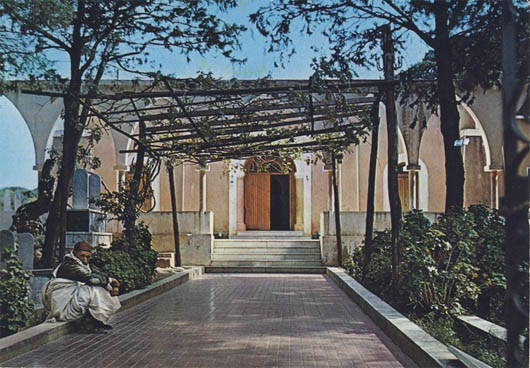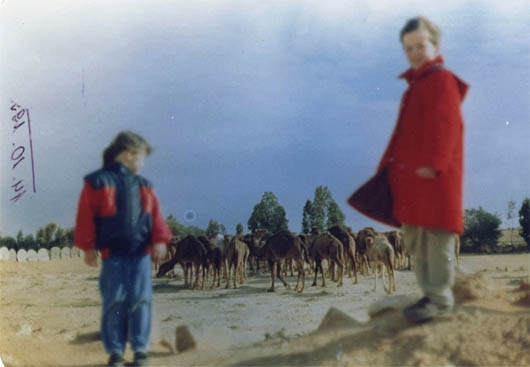 THE PAST
THE PAST In Which We Experience The Charm Of A Libyan Night
 Thursday, August 4, 2011 at 11:15AM
Thursday, August 4, 2011 at 11:15AM 
Teacher's Pet
by SUMEJA TULIC
My first memory is very dull and searing: a huge sun squeezing out air, mirages coming out of the pavement and me jumping from one bare foot to the other. My life began there, in the suburb of Ajdabiya, in a compound rented by the company in which my father worked. Judging by the shells we’d find when digging just a few inches beneath the surface, the compound, an hour away from the coast, was situated on soil once a seabed. Having spent preschool years digging in search of treasure and running after the ice cream van that cleverly came in the gaaila (siesta) when all parents slept, life seemed magical, sticky and painted in all possible varieties of warmth and happiness.
The beginning of my life as a pupil made life less magical and more practical, and it brought three things: the color green, ambition and ideology. At the age of nine, my motivation to be the best in my class came from hoping that good grades and outstanding display of revolutionary and anti-American spirit would lead me to meeting baba Muammar al Qadaffi. Of course, my favourite color was green and whenever someone asked how old I was, I would say I was born in 1985, the year before the Christian-Western aggression on Tripoli, in Al Haddra (the Green) hospital.
From then on, my green childhood became a string of very long summer holidays that would eventually culminate in Al Fatih’s public celebrations of the revolutions. I loved it all: the chanting and the dancing for him, the slogans from his book on TV before the news, him speaking endlessly in Libyan colloquial about the Great Man-Made River brought from deep within the Sahara, having a pencil box with two hands cutting chains of imperialism, him or his paroles printed on our green gym wear. That Libya transfixed me. I was never Bosnian, European or white. The freckles on my face were mere testimonies of human will to overcome and shape the obvious and thus, the truth.

Suddenly, our green love experienced its autumn. In an early morning, Suleiman, our young and handsome imam, was arrested and taken away. There were no charges and no appeal. Suleiman was "too Muslim" with his white tunic and therefore, a threat to Jamahiriya. The morning he was taken away, many others also vanished. For months, there were no wedding celebrations. Women whispered, men didn’t gather. Life was painfully discrete and silent.In years to come, coffins were brought to the doorsteps of those taken away years ago, before the sunrise, as when they were handcuffed and taken away.
Years went by, fast and uneasy. The imposed economical sanctions on Libya meant fewer things to buy. Oddly, the so called social supermarket distributed Benetton apparel. We may have craved all sort of different sweets, but we were dressed in Italian designer cloth from a decade ago.

Soon, satellite dishes appeared on roof tops. That changed our lives. We were shocked to learn that the U.S.A. did not have fires or tornado attacks each day, as the Libyan news has been reporting night after night.
One of those hot summer nights, I gazed at the moon trying to recite a classical Arab poem praising the beauty of the moon and the charm of the night. In midst of many failed attempts, one of my friends told me that the Americans carved Qaddafi’s face on the moon. I tried to reason with her, to explain the obvious. As I simultaneously held both arms, shaking her, I screamed “We are their enemy! Why would they want his face on the moon?!” Back at home, my father had to explain another difference between people: there are regular friends and there are friends whose parents are military personnel.
 the author & her sister
the author & her sister
In 1995 came the last stroke. In response to peace efforts between Palestinians and Israeli government, Qadaffi expelled some 30,000 Palestinians living in Libya. Some of them were left on the border, in the middle of the desert. The family of my friend Ilham was one of those expelled. Month after Ilham left, I watched the father of the first boy I ever liked being hanged on the national TV for treason and conspiracy against the Revolution.
Needless to say, I never met the man dressed in funky outfits, the one who lived in an illusion soaking in blood and oil, fear and hatred. Instead I met Hannan, Aisha, Salah, Miftah, Sayf, Ruwayda. Summer nights, we talked with each other, shouting from the sootoohs (roof tops) of our houses. The unbearable heat and the low voltage at which no air-conditioning worked meant we would be sleeping there, just beneath the sky. I was never content as I was back then. I knew harshness, injustice and evil – Sarajevo was under siege, Libya was beneath a claw – still, I felt freedom within. Anguish would come like a sandstorm, usually in the late morning and it would completely disappear by the time we drank our afternoon tea.
Dictators are "for real"; an invariable circumstance that is an integral part of an individual plan. Unlike democratically elected presidents, who are just that: a choice on a piece of paper that we or Florida made, a topless man playing hoops or a stubborn cowboy, a long relationship that will end up with him moving out. Dictators are here to stay, to have and to hold, from forever to ever, for worse, for poorer, in sickness and in health. Until recently, this union might end with one becoming a dissident. Today, you can end it by become a revolutionary standing in a square or behind a machine gun. Even then, with everything at stake, the connection remains. It is not a type of Stockholm syndrome. Nothing like it! It is a weird lasting link built of conflicting emotions and memories that can be reduced to one sentence: all the people and things we loved and lost because of people we used to admire.
Sumeja Tulic is the senior contributor to This Recording. She is a writer living in Sarajevo. She last wrote in these pages about her picnic.

"The Falling Snow" - Damien Jurado (mp3)
"Kansas City" - Damien Jurado (mp3)
"Kalama" - Damien Jurado (mp3)

 bosnia,
bosnia,  libya,
libya,  sumeja tulic
sumeja tulic 






































